
Find Help
More Items From Ergsy search
-

Should UK travelers be concerned about Zika virus?
Relevance: 100%
-

Is the UK government providing guidance on Zika virus for travelers?
Relevance: 100%
-

Is Zika virus present in the UK?
Relevance: 96%
-
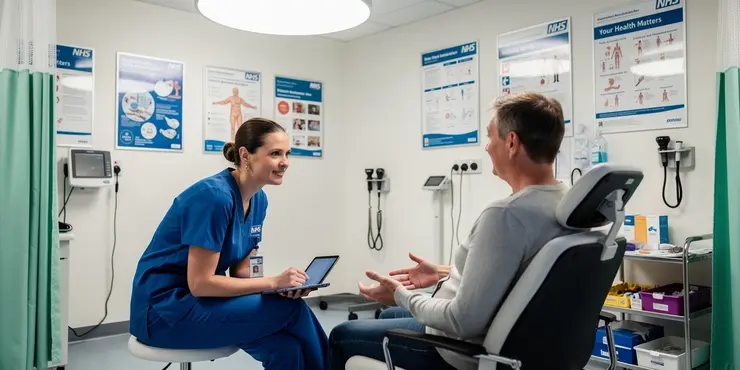
Does the UK have Zika virus?
Relevance: 93%
-

How can UK residents protect themselves from Zika virus when traveling?
Relevance: 88%
-

Are UK mosquitoes capable of transmitting Zika virus?
Relevance: 86%
-

What should someone from the UK do if they think they have Zika virus after traveling?
Relevance: 85%
-
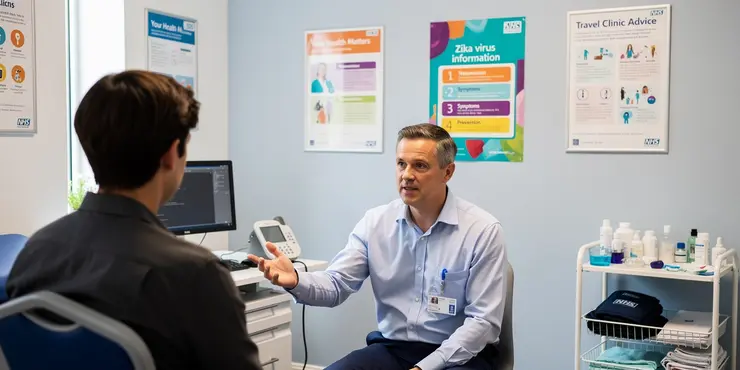
Can Zika virus be spread from person to person in the UK?
Relevance: 84%
-

Can men in the UK transmit Zika virus if infected?
Relevance: 84%
-
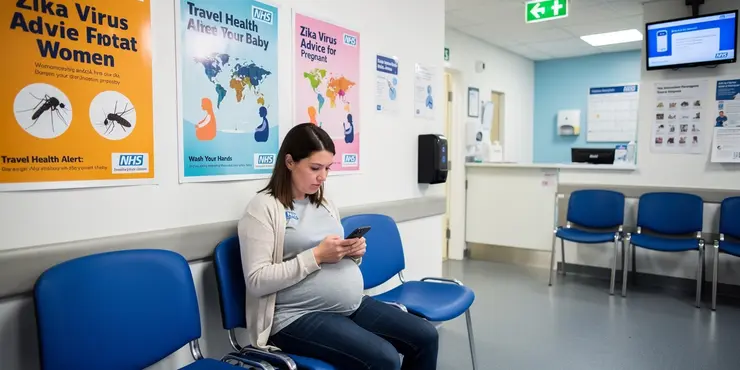
What precautions should pregnant women in the UK take regarding Zika virus?
Relevance: 80%
-
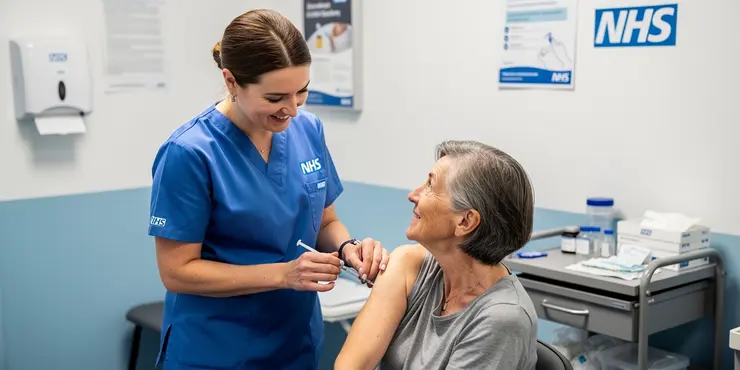
Is there a vaccine for the Zika virus?
Relevance: 79%
-

Can Zika virus affect pregnancy?
Relevance: 77%
-

How is the Zika virus transmitted?
Relevance: 75%
-
Is Zika virus screened for in blood transfusions?
Relevance: 75%
-

Where can I find the latest updates on Zika virus risk areas?
Relevance: 72%
-

What are the symptoms of Zika virus?
Relevance: 72%
-

Are there any Zika virus outbreaks currently?
Relevance: 55%
-

How prevalent is West Nile virus in the UK?
Relevance: 46%
-

What is Chikungunya virus infection?
Relevance: 45%
-
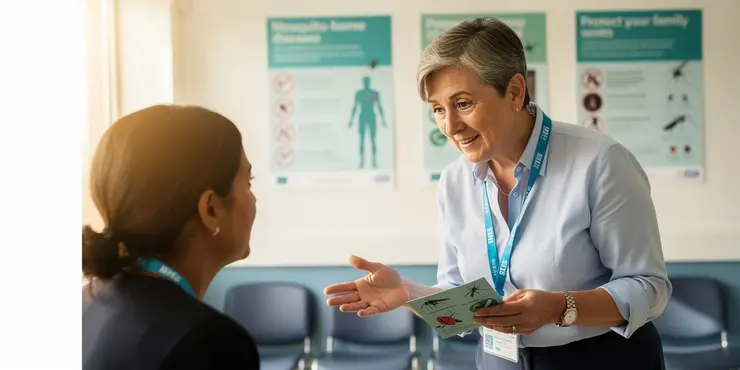
Are there any new mosquito-borne diseases emerging in the UK in 2025?
Relevance: 44%
-

What other viruses are tested for in blood donations?
Relevance: 44%
-
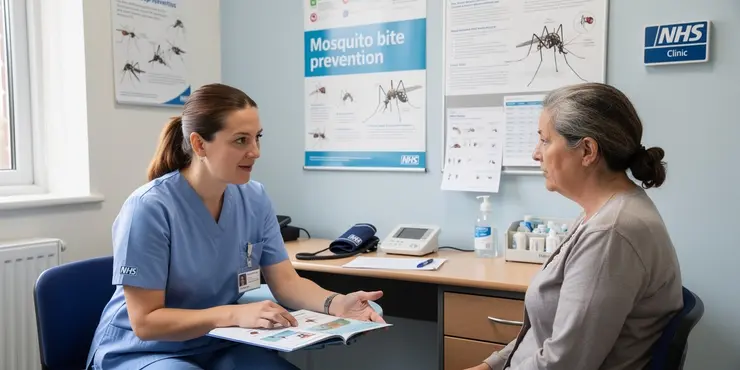
How is Chikungunya virus transmitted?
Relevance: 41%
-
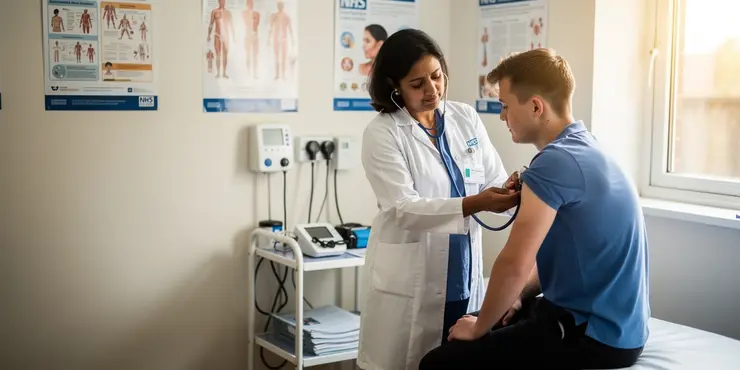
How is Chikungunya virus infection diagnosed?
Relevance: 40%
-

What diseases are spread by mosquitos in the UK in 2025?
Relevance: 39%
-

What is West Nile Virus?
Relevance: 38%
-

Do UK citizens need travel insurance for Europe?
Relevance: 37%
-

Is there a vaccine for West Nile Virus?
Relevance: 37%
-

Do UK citizens need a visa to travel to France?
Relevance: 37%
-
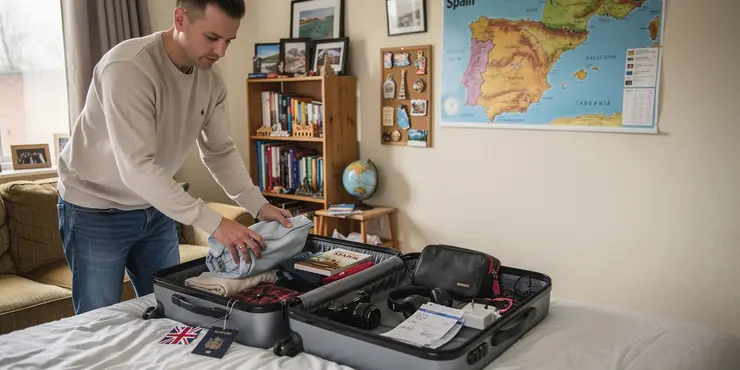
Can UK citizens travel to Spain without a visa?
Relevance: 37%
-

Are any vaccines available in the UK for mosquito-borne diseases?
Relevance: 37%
-

Are there border checks for UK travelers entering France or Spain by car?
Relevance: 36%
-

What are the rules for travel to France, Spain, and Europe on a UK passport?
Relevance: 36%
-
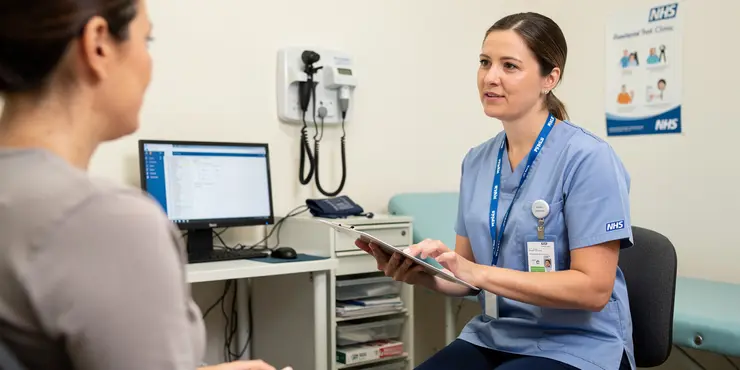
What should travelers to the UK know about mosquito-borne diseases?
Relevance: 35%
-

Is there a test for West Nile Virus?
Relevance: 34%
-
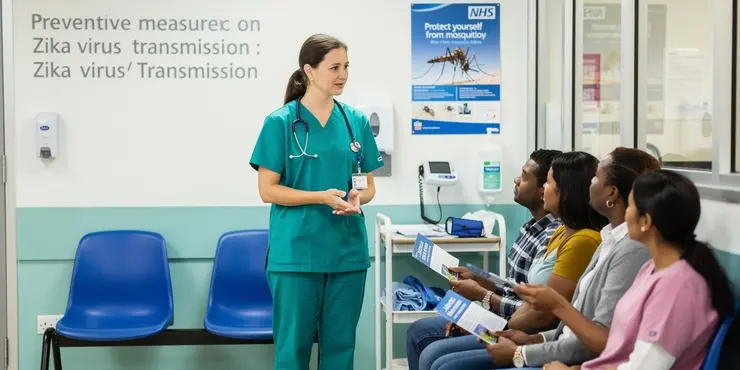
What measures are in place to prevent Zika virus transmission in the UK?
Relevance: 34%
-
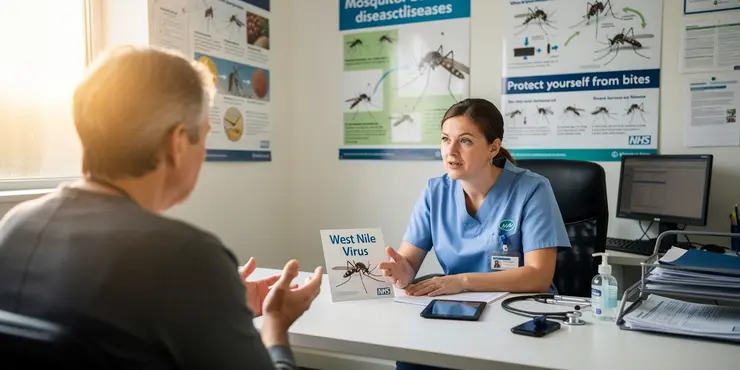
What is West Nile Virus?
Relevance: 33%
-
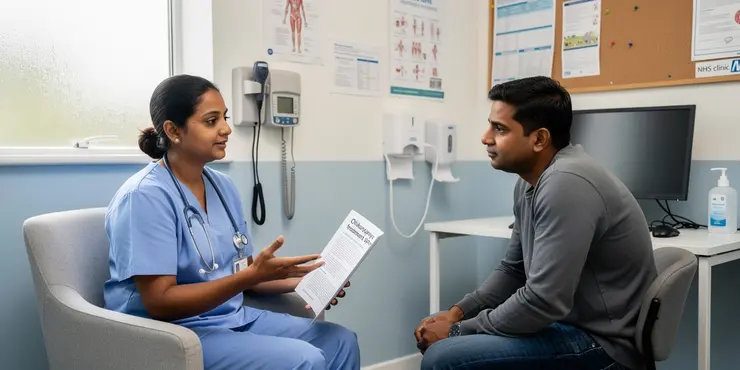
Can Chikungunya virus infection be treated?
Relevance: 33%
-

What should someone do if they suspect Nipah Virus infection?
Relevance: 33%
-

Do UK mosquitoes carry diseases?
Relevance: 33%
-

Is it necessary to get a measles vaccine before travelling?
Relevance: 33%
Understanding the Zika Virus
The Zika virus is a mosquito-borne virus primarily transmitted by Aedes mosquitoes, which are most active during the day. Originating in Africa, it has spread to parts of Asia, the Americas, and the Pacific Islands. Most people infected with the Zika virus experience mild symptoms, if any, including fever, rash, conjunctivitis, muscle and joint pain, and headache.
Zika Virus and Its Impact on Travelers
Although instances of Zika virus infections have decreased since the pandemic outbreak in 2015-2016, it remains a concern for travelers visiting regions where the virus is still prevalent. The primary risk associated with Zika is its potential impact on pregnant women. The virus can cause serious birth defects, including microcephaly, if a woman is infected during pregnancy. This has raised particular concerns for travelers considering a trip to Zika-affected areas.
Current Zika Virus Situations
As of the latest data, Zika virus is not a significant threat in the UK, given the absence of the Aedes mosquitoes that spread it. However, for UK travelers visiting areas where Zika is present, particularly tropical and subtropical regions, it's crucial to stay informed about the latest updates on Zika outbreaks. Countries in Central and South America, the Caribbean, Southeast Asia, and parts of Africa and the Pacific might still report cases of the virus.
Precautionary Measures for Travelers
UK travelers can take several precautions to minimize the risk of Zika virus infection. Using insect repellent, wearing long clothes, and staying in accommodations with air conditioning or windows and doors that are securely closed contribute significantly to reducing mosquito bites. Additionally, individuals are advised to prevent sexual transmission of the virus by using condoms or abstaining from sex during travel and for a period after returning from a Zika-affected area.
Guidelines for Pregnant Women and Planning Pregnancy
The NHS and Public Health England advise pregnant women to avoid traveling to areas with active Zika virus transmission. Anyone planning a pregnancy should consider postponing travel to these regions or take extra precautions. Women should wait at least eight weeks after potential Zika virus exposure or symptoms to conceive. Men are advised to wait at least six months.
Conclusion
While the risk of Zika virus infection for UK travelers is low, staying informed and taking necessary precautions can help safeguard health and well-being, especially for those who are or might become pregnant. By keeping abreast of travel advisories and health recommendations, UK travelers can make informed decisions and protect themselves against the Zika virus during their travels.
Understanding the Zika Virus
The Zika virus spreads through mosquito bites. The mosquitoes that carry it are called Aedes. They bite mostly during the day. This virus started in Africa but is now in Asia, the Americas, and the Pacific Islands. If someone gets the Zika virus, they might feel a little sick. They could have a fever, rash, red eyes, muscle aches, or headaches. Some people may not feel sick at all.
Zika Virus and Travelers
There are not as many Zika cases now as there were in 2015-2016, but travelers to some areas should still be careful. Zika is mostly a worry for pregnant women. If a pregnant woman catches the virus, it can lead to birth problems, like a baby with a small head. This is why travelers thinking about going to places with Zika should be careful.
Where is the Zika Virus Now?
In the UK, there is no big worry about Zika because the mosquitoes that spread it do not live there. But if you’re going to places where Zika still exists, like tropical or warm areas, it is important to learn about any new outbreaks. Places such as Central and South America, the Caribbean, and parts of Asia and Africa might still have Zika cases.
How Travelers Can Stay Safe
If you are traveling from the UK, you can do things to avoid Zika. Use insect repellent and wear long clothes to protect your skin. Stay in places with air conditioning or where windows and doors can close well to keep mosquitoes out. To avoid spreading Zika, use condoms or do not have sex while traveling and after coming back from a place with Zika.
Tips for Pregnant Women and Families Planning Babies
The NHS says pregnant women should not go to places where there is Zika. If someone is thinking about having a baby, they should wait or be very careful if traveling. Women should wait at least eight weeks after being in a place with Zika before trying for a baby. Men should wait six months.
Conclusion
For travelers from the UK, the risk of getting Zika is small, but it is good to be careful. This is especially true for people who are pregnant or may become pregnant. By following health advice and learning about where Zika is, travelers can stay safe and healthy on their trips.
Frequently Asked Questions
What is the Zika virus?
The Zika virus is primarily transmitted through the bite of an infected Aedes mosquito and can cause symptoms like fever, rash, joint pain, and conjunctivitis.
Should UK travelers be concerned about the Zika virus?
UK travelers may need to be concerned about the Zika virus if they are traveling to areas where the virus is actively transmitted.
Which countries are currently experiencing Zika outbreaks?
Travelers should check the latest travel advisories from health authorities such as the UK Foreign Office or the World Health Organization for information on current Zika outbreaks.
What precautions should travelers take to prevent Zika infection?
Travelers should use insect repellent, wear long-sleeved clothing, stay in air-conditioned or well-screened accommodations, and avoid areas with known Zika outbreaks.
Is there a vaccine for the Zika virus?
As of now, there is no vaccine available for the Zika virus.
What are the symptoms of Zika virus infection?
Symptoms can include fever, rash, joint pain, muscle pain, headache, and conjunctivitis, but many people may not have any symptoms.
How is Zika virus transmitted?
Zika virus is primarily spread by the bite of an infected Aedes species mosquito. It can also be transmitted through sexual contact, blood transfusion, and from mother to child during pregnancy.
What should pregnant travelers know about Zika virus?
Pregnant travelers should be especially cautious, as Zika infection during pregnancy can cause serious birth defects. It is advised that they avoid traveling to areas with Zika outbreaks.
How can I find out if my travel destination has a Zika risk?
Consult the latest travel advisories from public health organizations such as the World Health Organization or the UK government for the most up-to-date information on Zika risk areas.
Can Zika virus be transmitted from person to person?
Yes, Zika can be transmitted sexually from an infected person to their partner and can also be passed from a pregnant woman to her fetus.
Is it safe to travel to regions with confirmed Zika cases?
Travelers should carefully consider the risks, especially pregnant women or those planning to become pregnant, and take appropriate precautions if travel is necessary.
What should I do if I suspect I have contracted the Zika virus while traveling?
Seek medical attention promptly and inform your healthcare provider about your recent travel history.
Can men spread the Zika virus to their partners?
Yes, Zika can be spread from a man to his sexual partners, so using condoms or abstaining from sex is advised to prevent transmission.
How long should travelers take precautions to prevent sexual transmission of Zika after returning from an affected area?
Men should consider using condoms or abstaining from sex for at least 6 months, and women for at least 8 weeks after returning from an area with active Zika transmission.
Can Zika virus cause complications other than birth defects?
Yes, Zika has been linked to Guillain-Barré syndrome, a rare condition where the immune system attacks peripheral nerves.
What tests are available for diagnosing Zika virus?
Zika virus diagnosis is usually confirmed by PCR or serological tests performed on blood or urine samples.
Is there a specific treatment for Zika virus infection?
There is no specific treatment for Zika virus. Treatment focuses on relieving symptoms, such as pain and fever.
Does the Zika virus have a long-term impact on general health?
Most people infected with Zika virus recover fully, but there may be long-term risks for pregnancies and neurological complications.
How can travelers protect themselves from mosquito bites in Zika-prone areas?
Travelers are advised to use insect repellent, wear protective clothing, and stay indoors during peak mosquito activity times.
Who should UK travelers contact for up-to-date information on Zika outbreaks?
Travelers can check official sources like the UK Foreign Office or the World Health Organization for up-to-date information on Zika outbreaks and travel advice.
What is the Zika virus?
The Zika virus is a germ that can make people sick. It comes from mosquito bites. When mosquitoes bite people with the virus, they can carry it to others.
Here are some ways to help understand and learn about the Zika virus:
- Look at pictures of mosquitoes to know what they look like.
- Listen to someone explaining it to get more information.
- Use simple words to talk about Zika with friends or family.
The Zika virus spreads through the bite of a mosquito called Aedes. This can make you feel sick with signs like having a fever, a skin rash, sore joints, and red eyes.
If you need help reading, you can ask a friend to read with you. You can also use audiobooks or text-to-speech tools to listen to the text.
Do UK Travelers Need to Worry About the Zika Virus?
People from the UK should be careful about the Zika virus if they are going to places where the virus is spreading.
Which countries have Zika outbreaks now?
Zika is a virus that makes people sick. It is spread by mosquitoes. Some places have more people getting sick with Zika right now. These places are called outbreak areas.
To help you understand better, you can:
- Look at simple maps with outbreak areas marked.
- Use apps or websites with pictures and easy words.
- Ask someone to read the info with you.
People going on trips should look at the latest news about safety and health from places like the UK Foreign Office or the World Health Organization. This will help them know if there are any problems with Zika where they are going.
How can travelers stay safe from Zika?
If you are traveling to a place with Zika, here are some tips to help you:
- Use bug spray with DEET to keep mosquitoes away.
- Wear long sleeves and pants to cover your skin.
- Stay indoors with air conditioning or use window screens to keep mosquitoes out.
- Sleep under a mosquito net if you are outside.
- If you feel sick, see a doctor. Tell them you were traveling.
Tools and ideas to help:
- Ask someone to explain these tips to you.
- Use pictures to show you what to do.
- Use a checklist to pack your bug spray and long clothes.
If you are going on a trip, here are some ways to stay safe from bugs:
- Put bug spray on your skin.
- Wear clothes with long sleeves.
- Stay in places with air conditioning or places where bugs can't get in.
- Try not to go where there are lots of Zika bugs.
Using these tips can help you stay safe from getting sick.
Is there a shot to stop the Zika virus?
The Zika virus is a sickness you can get from a mosquito bite. Right now, there is no shot (vaccine) to stop Zika. But scientists are working to make one.
To stay safe from Zika, try these tips:
- Use bug spray to keep mosquitoes away.
- Wear clothes that cover your arms and legs.
- Stay inside when mosquitoes are out, usually early in the morning and evening.
Ask a grown-up or a doctor if you have more questions.
Right now, there is no shot to stop the Zika virus.
What happens if you get sick with the Zika virus?
You might feel sick with a fever, see a rash on your skin, or your joints might hurt. Your muscles could feel sore, you might have a headache, and your eyes could be red. But some people do not feel sick at all.
If it's hard to read, you can ask someone to read it to you. Drawing pictures about the words might help too!
How does Zika virus spread?
The Zika virus is spread mainly by a mosquito bite. The mosquito is called Aedes. You can also get Zika from sex, a blood transfusion, or if a mother passes it to her baby before birth.
Important Information for Pregnant Travelers about Zika Virus
If you are pregnant and traveling, here is what you need to know about the Zika virus:
- Zika Virus: A virus spread by mosquitoes.
- Where: Zika is in some countries. Check before you travel.
- Why It's Important: Zika can harm your baby.
- Protect Yourself:
- Wear long sleeves and pants.
- Use mosquito spray.
- Stay in places with air conditioning or window screens.
- Talk to Your Doctor: Ask your doctor for advice before traveling.
Make a plan and stay safe!
If you are pregnant, be extra careful. The Zika virus can hurt your baby. Try not to travel to places where there is a lot of Zika.
- Tip: You can use maps to check where Zika is spreading.
- Tip: Ask your doctor for advice before traveling.
How do I know if my holiday place has Zika?
Zika is a virus that can make people sick. It is important to know if the place you are going to visit has a risk of Zika. Here is how you can find out:
- Visit the health website to check for Zika info.
- Ask your doctor about Zika in your holiday place.
- Use a map app to see where Zika is a problem.
If you need help, ask a friend or family member to help you look it up on the internet.
Check the latest travel advice from health groups like the World Health Organization or the UK government. They have the newest news on places where Zika is a risk.
Can people pass the Zika virus to each other?
Yes, people can pass the Zika virus to each other. Here are some ways it can happen:
- Zika virus can spread through mosquito bites.
- Sometimes, a person can pass it to another person during sex.
- A mom can pass Zika virus to her baby during pregnancy.
If you want to learn more, you can:
- Ask a doctor or nurse.
- Look at helpful pictures about Zika virus.
- Watch videos that explain how Zika virus spreads.
Yes, Zika can spread through sex. If a person has Zika, they can give it to their partner. A pregnant woman with Zika can also pass it to her baby.
If you need help understanding, you can: - Use a dictionary to look up words you don't know. - Ask someone you trust to explain it to you. - Break the sentences into smaller parts to make them easier to read.
Is it safe to go to places with Zika?
Before you travel, check if Zika is in the area. Zika is a virus that can make people sick.
Here are things you can do to stay safe:
- Talk to a doctor before you go.
- Use bug spray to avoid mosquito bites.
- Wear long sleeves and pants to cover your skin.
- Sleep under a mosquito net.
- Keep windows and doors closed or use screens.
Ask for help if you need more information or don't understand something.
Travelers should think about the risks. This is very important for women who are pregnant or want to be pregnant. They need to be careful if they have to travel.
What should I do if I think I got the Zika virus while on a trip?
If you are worried you have the Zika virus, tell a doctor or nurse. They can help you feel better.
Here are some things you can do:
- Rest a lot to help your body get better.
- Drink water and other healthy drinks to stay strong.
- Take medicine like paracetamol to make any pain or fever go away.
You should also try to protect others. The Zika virus can spread from one person to another. Here are ways to stop that:
- Use insect repellent to stop mosquito bites.
- Wear long sleeves and pants so mosquitoes can't bite your skin.
Ask a friend or a family member for help if you need it. It is good to talk to others! They can help you understand what to do.
Go see a doctor quickly. Tell them where you have traveled recently.
Can men give the Zika virus to their partners?
Yes, men can pass the Zika virus to their partners. They can do this through unprotected sex. It's important to use condoms to stay safe.
If you have questions, talk to a doctor. They can help you understand more.
Yes, a man can give Zika to someone he has sex with. To stop Zika from spreading, people should use condoms or not have sex.
How long should people be careful about Zika after a trip?
After you come back from a place with Zika, be careful for a while. Zika can spread by sex.
Here is what you can do:
- Use condoms for a while after you get home.
- If you are worried, talk to a doctor. They can help you.
Stay safe and healthy!
Men should use condoms or not have sex for at least 6 months after coming back from a place where there is Zika. Women should do the same for at least 8 weeks.
Can the Zika virus cause problems other than birth defects?
Yes, Zika can cause a problem called Guillain-Barré syndrome. This is when the body's defense system attacks the nerves.
How do doctors find out if someone has the Zika virus?
Doctors can do tests to check if someone has the Zika virus. They usually use a blood or urine test. If you think you might have Zika, talk to a doctor. They will help you get the right test.
If reading or understanding is difficult, ask someone to read with you. You can also use a text-to-speech tool to listen to the words.
Doctors find out if someone has the Zika virus by doing special tests on their blood or pee. These tests help them know for sure if the virus is there.
Is there a special medicine for Zika virus?
There is no special medicine for Zika virus. If you have Zika, doctors try to help you feel better. They help with things like pain and feeling too hot (fever).
Here are some tips to feel better:
- Rest a lot
- Drink plenty of water
- Take medicine like paracetamol to help with pain and fever
Can the Zika virus affect our health for a long time?
The Zika virus can make some people feel sick. It is important to know if it can cause problems that last a long time. If you have questions, a doctor can help. Using pictures and simple words can make learning about the virus easier. You can also ask a friend or family member to explain it to you.
Most people who get the Zika virus get better. But there can be problems for babies if the mom has Zika. There can also be problems with the brain and nerves.
How can travelers stop mosquito bites in Zika places?
If you are going to a place with Zika, here are some ways to keep safe:
- Wear long sleeves and pants to cover your skin.
- Use bug spray with DEET on your skin.
- Sleep under a mosquito net.
- Stay in places with air conditioning or screens on windows.
These things can help keep mosquitoes away and protect you. You can also use pictures or ask someone to help explain these tips.
People who are traveling should use bug spray, wear clothes that cover their skin, and stay inside when there are lots of mosquitoes flying around.
Who can UK travelers talk to for the latest news on Zika outbreaks?
Travelers can look at official websites like the UK Foreign Office or the World Health Organization. These websites have the latest news about Zika outbreaks and travel advice.
Useful Links
This website offers general information and is not a substitute for professional advice.
Always seek guidance from qualified professionals.
If you have any medical concerns or need urgent help, contact a healthcare professional or emergency services immediately.
Some of this content was generated with AI assistance. We’ve done our best to keep it accurate, helpful, and human-friendly.
- Ergsy carfully checks the information in the videos we provide here.
- Videos shown by Youtube after a video has completed, have NOT been reviewed by ERGSY.
- To view, click the arrow in centre of video.
- Most of the videos you find here will have subtitles and/or closed captions available.
- You may need to turn these on, and choose your preferred language.
- Go to the video you'd like to watch.
- If closed captions (CC) are available, settings will be visible on the bottom right of the video player.
- To turn on Captions, click settings .
- To turn off Captions, click settings again.
More Items From Ergsy search
-

Should UK travelers be concerned about Zika virus?
Relevance: 100%
-

Is the UK government providing guidance on Zika virus for travelers?
Relevance: 100%
-

Is Zika virus present in the UK?
Relevance: 96%
-

Does the UK have Zika virus?
Relevance: 93%
-

How can UK residents protect themselves from Zika virus when traveling?
Relevance: 88%
-

Are UK mosquitoes capable of transmitting Zika virus?
Relevance: 86%
-

What should someone from the UK do if they think they have Zika virus after traveling?
Relevance: 85%
-

Can Zika virus be spread from person to person in the UK?
Relevance: 84%
-

Can men in the UK transmit Zika virus if infected?
Relevance: 84%
-

What precautions should pregnant women in the UK take regarding Zika virus?
Relevance: 80%
-

Is there a vaccine for the Zika virus?
Relevance: 79%
-

Can Zika virus affect pregnancy?
Relevance: 77%
-

How is the Zika virus transmitted?
Relevance: 75%
-
Is Zika virus screened for in blood transfusions?
Relevance: 75%
-

Where can I find the latest updates on Zika virus risk areas?
Relevance: 72%
-

What are the symptoms of Zika virus?
Relevance: 72%
-

Are there any Zika virus outbreaks currently?
Relevance: 55%
-

How prevalent is West Nile virus in the UK?
Relevance: 46%
-

What is Chikungunya virus infection?
Relevance: 45%
-

Are there any new mosquito-borne diseases emerging in the UK in 2025?
Relevance: 44%
-

What other viruses are tested for in blood donations?
Relevance: 44%
-

How is Chikungunya virus transmitted?
Relevance: 41%
-

How is Chikungunya virus infection diagnosed?
Relevance: 40%
-

What diseases are spread by mosquitos in the UK in 2025?
Relevance: 39%
-

What is West Nile Virus?
Relevance: 38%
-

Do UK citizens need travel insurance for Europe?
Relevance: 37%
-

Is there a vaccine for West Nile Virus?
Relevance: 37%
-

Do UK citizens need a visa to travel to France?
Relevance: 37%
-

Can UK citizens travel to Spain without a visa?
Relevance: 37%
-

Are any vaccines available in the UK for mosquito-borne diseases?
Relevance: 37%
-

Are there border checks for UK travelers entering France or Spain by car?
Relevance: 36%
-

What are the rules for travel to France, Spain, and Europe on a UK passport?
Relevance: 36%
-

What should travelers to the UK know about mosquito-borne diseases?
Relevance: 35%
-

Is there a test for West Nile Virus?
Relevance: 34%
-

What measures are in place to prevent Zika virus transmission in the UK?
Relevance: 34%
-

What is West Nile Virus?
Relevance: 33%
-

Can Chikungunya virus infection be treated?
Relevance: 33%
-

What should someone do if they suspect Nipah Virus infection?
Relevance: 33%
-

Do UK mosquitoes carry diseases?
Relevance: 33%
-

Is it necessary to get a measles vaccine before travelling?
Relevance: 33%


